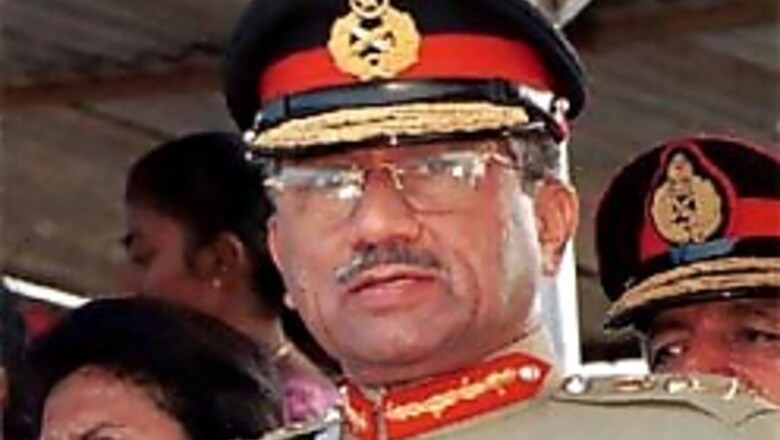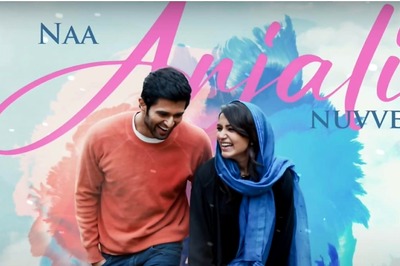
views
Islamabad: Pakistan President General Pervez Musharraf has said that India’s uranium enrichment programme was likely based on the Pakistani centrifuge design.
In his book, In The Line of Fire, some excerpts of which was quoted by The Nation, Musharraf said during 1994-95, nuclear scientist A Q Khan had ordered the manufacture of 200 P-1 centrifuges that had been discarded by Pakistan in the mid 80s.
These were dispatched to Dubai for onward distribution, which also hired several Indians who remain untraceable now.
As such, it could be possible that the Indian uranium enrichment programme might have its roots in the Dubai-based network and be a copy of the Pakistani centrifuge design, Musharraf said.
“In early 1999, I started seeing the first signs of some suspicious activities by A Q Khan. Our investigations revealed that Khan had started his activities as far back as 1987 primarily with Iran. In 1994-95, A Q Khan had ordered the manufacture of 200 P-1 centrifuges that had been discarded by Pakistan in the mid 80s,” Musharraf writes in his memoirs.
“These had been dispatched to Dubai for onward distribution. Khan was running a very personalised underground network of technology transfers around the world with his base in Dubai. The irony is that the Dubai-based network had employed several Indians, some of whom have since vanished."
“There is strong probability that the genesis of the Indian uranium enrichment programme may also have its roots in the Dubai-based network and could be a copy of the Pakistani centrifuge design. This has also been recently alluded to by an eminent US non-proliferation analyst,” Musharraf said.
Vajpayee and I were humiliated at Agra
Musharraf is of the view that both he and the then Indian prime minister Atal Bihari Vajpayee had been "humiliated" at the Agra summit in 2001 "by someone above" the two of them.
Writing about the failed summit in his book, Musharraf discloses that twice he had decided to cut short his stay in Agra after the Indians had "backed out" of what had been agreed earlier. However, he had been persuaded by his diplomats not to do so.
PAGE_BREAK
According to the General's account of the events in Agra, after two prolonged interactions with Vajpayee, a "balanced" joint declaration acceptable to both of them was drafted.
It contained a condemnation of terrorism and recognition that Kashmir needed to be resolved. "The signing ceremony was scheduled for the afternoon (of July 17) in the hotel J P Palace where prime minister Vajpayee was staying and where we held our dialogue. Preparations in the hotel were complete, down to the table and two chairs where we would sit for the signing ceremony," he writes.
Barely an hour later he had been informed by his foreign minister Abdul Sattar that "the Indians have backed out" as their Cabinet had rejected the draft.
There was no Indian Cabinet in Agra and "I became very angry, and my impulse was to leave for Islamabad immediately".
Mush reveals coup details in memoirs
The one hour on October 12, 1999, between 1845 hrs, IST 1945 hrs, IST in the evening, Pakistan's history changed dramatically, President Pervez Musharraf writes in In The Line of Fire.
Pakistan's news agency, SANA, quoted from some exclusive excerpts from an advance manuscript of the book in which Musharraf talks about the dramatic circumstances that elevated him as the country's head.
''It was October 12, 1999.The time was 1845 hrs, IST. The flight was PK 805. The plane was an Airbus. There were 198 passengers on board, many of them school children. We were due to land in 10 minutes,'' he writes. But then prime minister Nawaz Sharif had given explicit orders that the flight should not be allowed to land anywhere in Pakistan. “
'I told a crew member to ask Air Traffic Control again why they were not permitting us to land considering our precarious fuel situation. ‘
PAGE_BREAK
The reply, 'Climb to 21,000 feet and just get out of Pakistan and go anywhere.'
''Air Traffic Control suggested we head to Bombay, Oman, Abu Dhabi, or Bandar Abbas in Iran, just about anywhere except (for some reason) Dubai. They also informed our pilot that they had directed all airports not to let our plane land anywhere in Pakistan. No one below the Prime minister could give such a drastic order. Sacking an Army Chief is one thing, but hijacking his plane and sending it to India is diabolical.''
As the news of a political coup dawned on him, General Musharraf said his army rallied behind him. They were launching a counter coup. '' Major General Malik Iftikhar Ali Khan, the commander of an Army division in Karachi, made radio contact with the aircraft. 'Tell the chief to come back and land in Karachi,' he told the pilot. 'Everything is alright now.'''
''By 1945 hrs, IST, the counter coup had defeated Nawaz Sharif's coup throughout the country. My plane landed in Karachi by 1948 hrs, IST,'' said General Musharraf.
''Back in corps headquarters in Karachi, we were somewhat dazed. We decided not to do anything precipitate. What was needed first and foremost was to reassure a bewildered nation, but without making any rash promises until we had understood what we got into.'' he added.




















Comments
0 comment